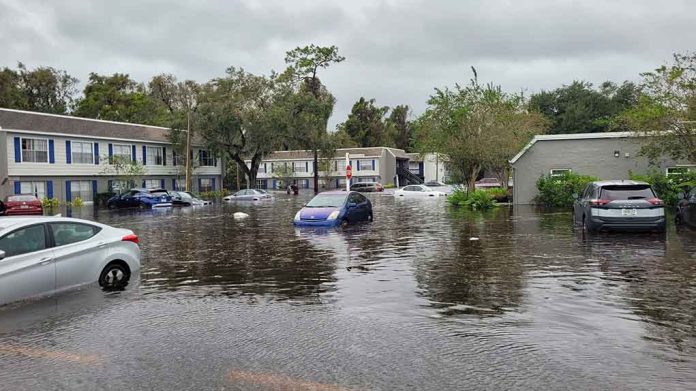
Tropical Storm Helene’s floods have left a lasting impact on North Carolina, where some residents now face the chilling prospect of winter without essential heating oil in the wake of this natural disaster.
At a Glance
- Tropical Storm Helene destroyed North Carolina’s only kerosene station, affecting heating oil access.
- Initial donations for heating fuel totaled over $271,000, but only $50,000 remains.
- Community and volunteer efforts strive to deliver supplies and heating fuel to affected areas.
- The Poplar Community Center operates as a hub for distributing aid.
Storm’s Impact on Communities
Residents in Avery and Mitchell counties, North Carolina, face winter without adequate heating fuel due to Tropical Storm Helene dismantling the area’s sole kerosene station. The storm significantly damaged infrastructure, leaving areas without electricity, phone connections, or internet access.
Trey Moore, a river educator, as of October, was using his network to gather supplies and volunteers to support affected areas like Poplar, a small mountain community of less than 300 residents with deep generational ties. Residents are adapting by using alternative heating sources, while the community prepares for several months without power.
North Carolina residents could face winter without heat https://t.co/7j4DRFrDAD
— FOX Business (@FoxBusiness) November 14, 2024
Efforts to Restore and Support
ElectriCities restored power to 80% of affected customers within five days, reducing outages to approximately 10,000. A coordinated response brought 30 ElectriCities member communities together, involving line crews, equipment, and supplies. Fortunately, there were no injuries reported among the lineworkers.
Rhonda Jean Kowald, alongside the Western Carolina Emergency Network, is actively delivering fuel to firehouses for distribution. With demands rising, the need for donations persists, as current funding sustains only up to a week and a half. Kowald emphasizes the ongoing significant, unmet need.
Community Resilience and Support
The community of Poplar has turned to volunteer-driven efforts to provide support for its residents amid these challenges. Volunteers, such as Misty Hughes, coordinate supplies, support, and welfare checks on the elderly and disabled. Efforts are being made to incorporate innovative solutions, like solar generators, to reduce fuel consumption.
Residents remain resilient, despite facing substantial damages and a prolonged period without utilities, relying on stored supplies and ingenuity. Collective efforts continue to ensure the needs of the community are met in these challenging times. Local initiatives have become critical in maintaining access to essential resources, helping bridge the gap caused by the storm’s destruction.
Sources
- North Carolina residents could face winter without heat
- This mountain hamlet hit by Helene flooding preps for a winter without power
- ElectriCities Members Rally for Hurricane Helene Relief Efforts

















